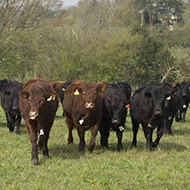
£5.7 million project supports farmers across England
The BVD Stamp it Out initiative, which aims to tackle bovine viral diarrhoea (BVD) in cattle, has been extended by six months in England as a result of the COVID-19 pandemic.
Launched by Defra in 2018, the project is delivered by SAC Consulting, part of Scotland’s Rural College (SRUC). 120 veterinary practices were recruited in the first six months of the programme, to deliver the programme to farmers across the country.
According to SRUC, feedback suggests the project has had a hugely positive impact. With 100 per cent of respondents believing they are in a better position to eradicate the disease at farm level.
Unfortunately, restrictions caused by the COVID-19 pandemic have meant that veterinary professionals have been less able to visit farms to deliver the project. For this reason, Defra has extended the BVD Stamp it Out deadline to June of 2021.
Neil Carter, project manager at SAC Consulting, said: “We built some real momentum through 2019 and early 2020, and with 5,500 farmers enrolled in the project, we are well on the way to engaging the target of 8,000 herds across England.
“This extension gives vet practices the chance to complete the process for those involved and engage another 2,500 farmers into the mix.”
The programme provides farmers with funded time with their vet, £61.80 for preliminary testing work, and up to £440 in cases where there is evidence of persistently infected animals.
Christine Middlemiss, the UK’s chief veterinary officer, said: “This scheme is an excellent opportunity to tackle BVD. I encourage farmers and vets who have not already done so, to take advantage of this extension to the project and sign up now to benefit.”
Image (c) SRUC.



 The veterinary mental health charity Vetlife is inviting the veterinary community to join it for a sponsored cold-water dip.
The veterinary mental health charity Vetlife is inviting the veterinary community to join it for a sponsored cold-water dip.